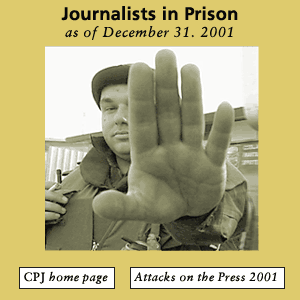Prosecutors close investigation into journalists abduction
New York, April 19, 2004—The Committee to Protect Journalists (CPJ) has learned that prosecutors in Belarus’ capital, Minsk, have suspended their criminal inquiry into the July 7, 2000, abduction of Dmitry Zavadsky, a 29-year-old cameraman for the Russian public television network ORT, who disappeared in July 2000. Ivan Branchel, deputy head of the prosecutor’s organized…
Attacks on the Press 2003: Europe and Central Asia Analysis
While integration into NATO and the European Union has had a positive effect on press freedom conditions in most of Central Europe and the Baltic states, the situation for journalists in Russia and the former Soviet republics has worsened steadily, with governments relying on authoritarian tactics to silence the media. Even reformist governments in the…
Attacks on the Press 2003: Belarus
Squeezed by the expansion of NATO and the European Union to the west and tepid relations with Russia to the east, Belarus grew ever more isolated. In the face of that isolation, President Aleksandr Lukashenko continued his assault on the media in 2003, tightening his grip on the impoverished country. Local analysts suspect that Lukashenko’s…
Court declares missing journalist dead
New York, December 2, 2003—Last week, a district court in the Belarus’ capital, Minsk, declared journalist Dmitry Zavadsky officially dead. Zavadsky, a 29-year-old cameraman for the Russian public television network ORT, disappeared in July 2000. According to local press reports, the cameraman’s widow, Svetlana Zavadskaya, initiated the judicial process in October 2003. Zavadsky’s body was…
Attacks on the Press 2002: Belarus
In May 2002, CPJ named Belarus one of the world’s 10 worst places to be a journalist, highlighting the stifling repression of Europe’s most authoritarian regime. The rest of the year brought more bad news for the country’s besieged but strong-willed private media, with President Aleksandr Lukashenko tightening his grip on power while the economy…
CPJ calls for international inquiry into cameraman’s disappearance
New York, April 2, 2002—CPJ calls for an independent, international inquiry into the July 2000 disappearance of Belarusian cameraman Dmitry Zavadsky. Although two former members of the elite Almaz special forces unit were recently convicted of kidnapping Zavadsky, local sources view them as scapegoats. CPJ is disturbed that state prosecutors failed to investigate allegations that…
Attacks on the Press 2001: Europe & Central Asia
The exhilarating prospect of broad press freedoms that followed the collapse of the Soviet Union a decade ago has faded dramatically in much of the post-communist world. A considerable decline in press freedom conditions in Russia during the last year, along with the stranglehold authoritarian leaders have imposed on media in Central Asia, the Caucasus,…
Attacks on the Press 2001: Belarus
President Aleksandr Lukashenko continued his assault on the independent and opposition press in 2001, and he managed to cling to power in September 9 presidential elections amid charges of human rights violations and extensive electoral fraud. Throughout the year, independent publications faced harassment, censorship, seizures, and closures for criticizing the regime. Little progress was made…

Attacks on the Press 2001: Journalists in Prison
There were 118 journalists in prison around the world at the end of 2001 who were jailed for practicing their profession. The number is up significantly from the previous year, when 81 journalists were in jail, and represents a return to the level of 1998, when 118 were also imprisoned.
CPJ denounces closure of independent weekly newspaper
New York, November 13, 2001—The Committee to Protect Journalists (CPJ) denounced a Belarusian High Economic Court decision to shut down the Hrodno-based independent weekly Pahonya. Yesterday the court found Pahonya guilty of insulting President Aleksandr Lukashenko and publishing the statements of an unregistered civic organization, according to local and international press reports. The newspaper had…